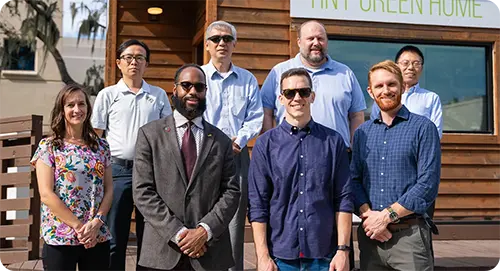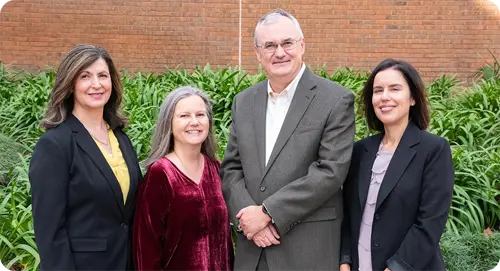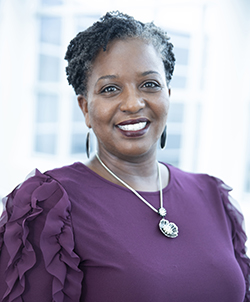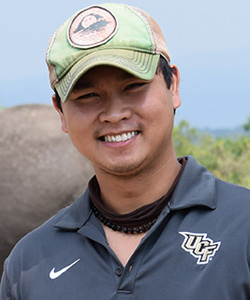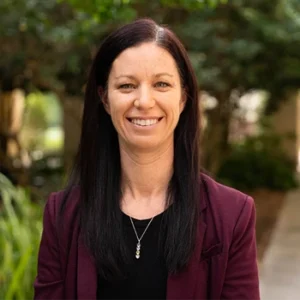High-Impact Research
Researchers at the College of Community Innovation and Education are driven by a singular belief: research should push boundaries and forge new ideas to transform lives. This approach is dynamic and collaborative, bringing together diverse minds and perspectives to tackle the toughest challenges facing our communities — locally, nationally, and globally.
Through our innovative interdisciplinary research teams and strong partnerships with both private and public organizations, we’re not just studying problems; we’re actively developing solutions. Our commitment to community engagement ensures that our work remains grounded and relevant, making a tangible impact where it matters most.
The CCIE Research and Administration Services Team is a critical resource for UCF faculty members to explore bold ideas that challenge convention and drive progress. Together, we’re advancing scholarship across diverse disciplines and directly shaping the future of our communities.
Funded Research
Discover the impactful research at the College of Community Innovation and Education, where our faculty secure millions of dollars annually from prestigious federal, state, and community organizations. With more than 50 research projects funded, our collaborations extend to renowned agencies such as the National Science Foundation, the U.S. Department of Education, the U.S. Department of Health and Human Services, and the Florida Supreme Court. Explore our diverse portfolio of projects addressing critical societal issues and driving meaningful change.
Funded Research and Contracts
(2023-2024)
Funded Research and Projects
Centers and Institutes
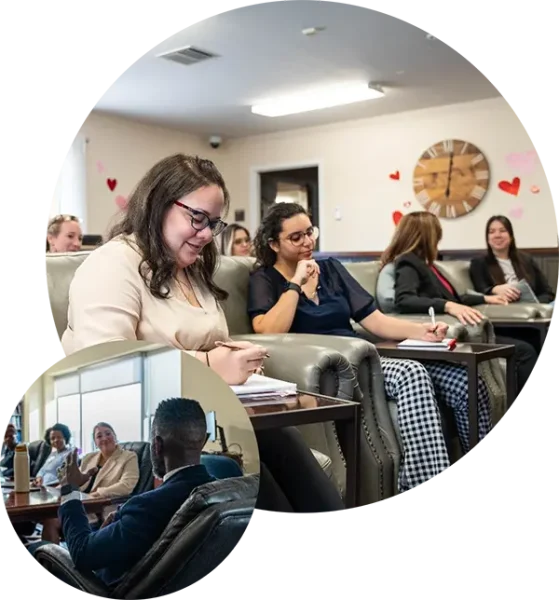 Faculty researchers at the College of Community Innovation and Education are committed to making a meaningful impact beyond the classroom. Through dynamic partnerships with our established Centers and Institutes, faculty and student researchers go beyond traditional boundaries, fostering collaboration and developing innovative real-world solutions to address pressing needs. By working hand in hand with community stakeholders, our researchers gain crucial insights and ensure that their work addresses the genuine needs of the community.
Faculty researchers at the College of Community Innovation and Education are committed to making a meaningful impact beyond the classroom. Through dynamic partnerships with our established Centers and Institutes, faculty and student researchers go beyond traditional boundaries, fostering collaboration and developing innovative real-world solutions to address pressing needs. By working hand in hand with community stakeholders, our researchers gain crucial insights and ensure that their work addresses the genuine needs of the community.
From conducting groundbreaking studies to offering expert consultation and support, our faculty-led initiatives span a wide range of disciplines and interests. Whether it’s developing sustainable education solutions, advancing mental health practices, or promoting organizational capacity for nonprofits, our researchers are at the forefront of positive change. Explore our diverse portfolio of research collaborations and discover how we’re making a difference together.
- Center for Community Schools
- Center for Decision Support Systems and Informatics
- Center for Public and Nonprofit Management
- Center for Research in Education Simulation Technology
- Center for Social and Civic Prosperity
- Community Counseling and Research Center
- Florida Center for Students with Unique Abilities
- Morgridge International Reading Center
- Program Evaluation and Educational Research Group
- Toni Jennings Exceptional Education Institute
- UCF Marriage and Family Research Institute
Recognition and Achievements
2024-25
Dr. Seongho An, Associate Editor, Quality & Quantity: International Journal of Methodology, School of Public Administration.
Dr. Basia Andraka-Christou, Field Editor, Journal of Studies of Alcohol and Drugs; Associate Editor, Journal of Substance Use and Addiction, School of Global Health Management & Informatics.
Dr. Andrea Borowczak, Co-Editor in Chief, Journal of Science Teacher Education; Associate Editor, The ASEE Computers in Education Journal (CoED), School of Teacher Education.
Dr. Dan Eadens, Associate Editor, International Journal for Educational Professionals, Department of Educational Leadership and Higher Education.
Dr. Jacinta Gau, Co-Editor, Criminology & Public Policy - Wiley Online Library, Department of Criminal Justice.
Dr. Glenda Gunter, Associate Editor, Journal of Formative Design in Learning, Department of Learning Sciences & Educational Research.
Dr. Varadraj Prabhu Gurupur, Associate Editor, Frontiers in Digital Health; Associate Editor, Journal of Integrative Medicine; Associate Editor, Journal of Integrated Design Process Science, School of Global Health Management & Informatics.
Dr. Jeremy Hall, Editor-in-Chief, Public Works Management and Policy , School of Public Administration.
Dr. Richard Hartshorne, Editor-in-Chief, Journal of Technology & Teacher Education, Department of Learning Sciences & Educational Research.
Dr. Atsusi Hirumi, Consulting Editor, BMC Medical Education, Tech Trends; Educational Technology Research and Development, School of Teacher Education.
Dr. Shiva Jahani, Associate Methodology Editor, Journal of Hospitality and Tourism Insights, School of Teacher Education
Dr. J. Richelle Joe, Editor, The Professional Counselor, Department of Counselor Education & School Psychology.
Dr. Naim Kapucu, Associate Editor, Public Management Review; Associate Editor, Disaster Communications, School of Public Administration.
Dr. Michelle Kelley, Co-Editor, Literacy Practice and Research (OTEL), School of Teacher Education.
Dr. Claire Knox, Associate Editor, Journal of Homeland Security and Emergency Management; Associate Editor, Natural Hazards Review, School of Public Administration.
Dr. Debra L. McGann, Higher Education Editor, FAEA Fresh Paint Magazine, School of Teacher Education.
Dr. William Moreto, Associate Editor, Deviant Behavior, Department of Criminal Justice.
Dr. Joyce Nutta, Co-Editor, Journal of English Learner Education, School of Teacher Education.
Dr. Elsie L. Olan, Co-Editor, Florida Literacy Journal; Associate Editor, Frontiers in Education: Frontier in Secondary Education, School of Teacher Education.
Dr. Enrique Ortiz, Co-Editor, NCTM Mathematics Teacher: Learning and Teaching PK-12, School of Teacher Education.
Dr. Jennifer Peck, Editor-in-Chief, Journal of Crime and Justice, Department of Criminal Justice.
Dr. Bernardo Ramirez, International Advisory Committee Editorial Board, Caucasus Journal of Health Sciences and Public Health, Revista Gerencia y Política de Salud-Journal of Management and Health Policy, School of Global Health Management & Informatics.
Dr. James Ray, Associate Editor, International Journal of Offender Therapy and Comparative Criminology, Department of Criminal Justice.
Dr. Sherron Killingsworth Roberts, Associate Editor, Early Childhood Education Journal, School of Teacher Education.
Dr. William Russell, Editor-in-Chief, Journal of Social Studies Research, School of Teacher Education.
Dr. Sara Shaw, Managing Editor, Career and Technical Education Research (CTER), Department of Educational Leadership and Higher Education.
Dr. Judit Szente, Editor in Chief, Journal of Early Childhood Teacher Education, School of Teacher Education.
Dr. Michelle Taub, Associate Editor, Learning & Instruction; Associate Editor, International Journal of Artificial Intelligence in Education. Department of Learning Sciences & Educational Research.
Dr. Samuel D. Towne, Associate Editor, BMC Public Health, School of Global Health Management & Informatics.
Dr. Scott Waring, Editor-in-Chief, Social Studies and the Young Learner; Editor-in-Chief, Trends and Issues in Social Studies; Editor-in-Chief, Teaching with Primary Sources Journal, School of Teacher Education.
Dr. Jungwon Yeo, Associate Editor, Informatization Policy; Associate Editor, Natural Hazards Review, School of Public Administration.
Yara Asi was honored with the 2024 Victor Sidel and Barry Levy Award for Peace from the American Public Health Association.
Barbara "Basia" Andraka-Christou was awarded the 2024 Best Abstract by an Associated Professional from the National American Society of Addiction Medicine.
RoSusan Bartee was selected as the recipient of the 2024 Visionaries Award at the Education 2.0 Conference in Dubai.
The Department of Educational Leadership and Higher Education has been granted full membership to the University Council for Educational Administration (UCEA), the largest U.S.-based research-oriented member consortium of higher education institutions.
Su-I Hou was awarded a 2024-25 Fulbright-Saastomoinen Foundation Distinguished Chair Award in Health Sciences to Finland with the FINGER project team — focusing on promoting a healthy lifestyle for dementia prevention.
Naim Kapucu received a 2024-25 Fulbright Specialist Program award to Kazakhstan at Nazarbayev University.
Claire Knox was named a National Academy of Public Administration Fellow for the 2024-25 academic year.
Soyoung Park was awarded Learning Disability Quarterly’s Must-Read Article of 2024 award for the article, “Four Best Practices for Meta-Analysis: A Systematic Review of Methodological Rigor in Mathematics Interventions for Students with or at Risk of Disabilities."
Earlisha Whitfield received the 2024 Emerging Leader Award from The Society for Information Technology and Teacher Education.
Distinguished Lecture Series
The Distinguished Lecture Series hosts nationally and internationally prominent academic researchers and scholars focused on the most pressing research topics that impact education, community and policy-relevant knowledge.
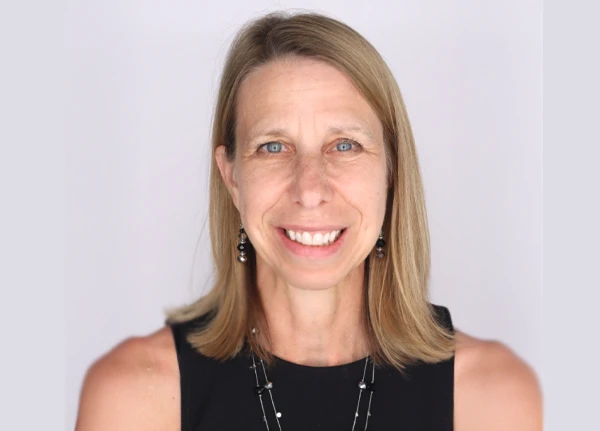
November 19, 2025
Carolyn J. Heinrich, Ph.D.
University Distinguished Professor of Leadership, Policy, and Organizations and Political Science and the Patricia and Rodes Hart Professor of Public Policy, Education and Economics, Vanderbilt University
Research Impact Showcase
Explore the latest research innovations from the College of Community Innovation and Education at the annual Research Impact Showcase. Join us as CCIE faculty and graduate students present their high-impact research across a diverse range of social issues spanning disciplines such as criminal justice, education and leadership, healthcare and administration, legal studies, mental health and public administration. Featuring poster presentations and a reception, this free event is open to the community and offers a glimpse of the impactful research our college engages in, as well as how it is used to enhance the quality of life for individuals in our region and beyond. See the 2025 winners.
Date and Time: Thursday, March 27, 3:00 - 6:00 p.m.
Location: UCF Morgridge International Reading Center
Research Administration
The Research Administration Services Team provides support to our faculty and student researchers. The team is here to assist you if you need help finding a grant funding source for your research or preparing a grant proposal. We also offer walk-in consulting for IRB proposals. Once your grant proposal is approved, we provide a full range of post-award services to help you launch your project and manage your award successfully.
Contact Us
Education Complex, Suite 106
407-823-4280
CCIERAST@ucf.edu
Our Team
-

Jean Bagga
Post-Award Specialist III -
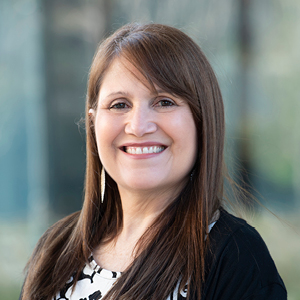
Maria Barreto
Contracts & Grants Specialist II -

Erin Blackwell
Associate Director, Contracts and Grants -

Yujun Huang
Post-Award Specialist III -

Joann Elmiger
Contracts and Grants Specialist III -

Rimy Jassal
Contracts and Grants Specialist II -

Norma Morell, Post Award Specialist II
Post-Award Specialist II
In the News
UCF Criminal Justice Associate Professor Aids Animals, Rangers and Communities Abroad
Associate Professor Leads Association of Mathematics Teacher Educators

